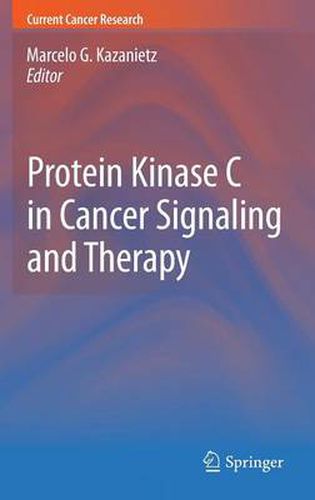Readings Newsletter
Become a Readings Member to make your shopping experience even easier.
Sign in or sign up for free!
You’re not far away from qualifying for FREE standard shipping within Australia
You’ve qualified for FREE standard shipping within Australia
The cart is loading…






This title is printed to order. This book may have been self-published. If so, we cannot guarantee the quality of the content. In the main most books will have gone through the editing process however some may not. We therefore suggest that you be aware of this before ordering this book. If in doubt check either the author or publisher’s details as we are unable to accept any returns unless they are faulty. Please contact us if you have any questions.
Protein kinase C (PKC), a family of serine-threonine kinases, rocketed to the forefront of the cancer research field in the early 1980’s with its identification as an effector of phorbol esters, natural products with tumor promoting activity. Phorbol esters had long been of interest to the cancer research field due to early studies in the mouse skin carcinogenesis model, which showed that prolonged topical application of phorbol esters promoted the formation of skin tumors on mice previously treated with mutagenic agents. Research in the last years has established key roles for PKC isozymes in the control of cell proliferation, migration, adhesion, and malignant transformation. In addition, there is a large body of evidence linking PKC to invasion and cancer cell metastasis. Moreover, it is now well established that the expression of PKC isozymes is altered in various types of cancers. More importantly, small molecule inhibitors have been developed with significant anti-cancer activity. The relevance of PKC isozymes in cancer signaling is therefore remarkable.
This book will have 4 sections. There will be 23 chapters. Each section will have a brief introduction by an expert in the field (~ 1-2 pages).
$9.00 standard shipping within Australia
FREE standard shipping within Australia for orders over $100.00
Express & International shipping calculated at checkout
This title is printed to order. This book may have been self-published. If so, we cannot guarantee the quality of the content. In the main most books will have gone through the editing process however some may not. We therefore suggest that you be aware of this before ordering this book. If in doubt check either the author or publisher’s details as we are unable to accept any returns unless they are faulty. Please contact us if you have any questions.
Protein kinase C (PKC), a family of serine-threonine kinases, rocketed to the forefront of the cancer research field in the early 1980’s with its identification as an effector of phorbol esters, natural products with tumor promoting activity. Phorbol esters had long been of interest to the cancer research field due to early studies in the mouse skin carcinogenesis model, which showed that prolonged topical application of phorbol esters promoted the formation of skin tumors on mice previously treated with mutagenic agents. Research in the last years has established key roles for PKC isozymes in the control of cell proliferation, migration, adhesion, and malignant transformation. In addition, there is a large body of evidence linking PKC to invasion and cancer cell metastasis. Moreover, it is now well established that the expression of PKC isozymes is altered in various types of cancers. More importantly, small molecule inhibitors have been developed with significant anti-cancer activity. The relevance of PKC isozymes in cancer signaling is therefore remarkable.
This book will have 4 sections. There will be 23 chapters. Each section will have a brief introduction by an expert in the field (~ 1-2 pages).